Machine Learning In Pharmaceutical Industry Market Overview
The global machine learning in pharmaceutical industry market was valued at USD 1.2 billion in 2021, and is projected to reach USD 26.2 billion by 2031, growing at a CAGR of 37.9% from 2022 to 2031.
Machine learning in pharmaceutical industry refers to the use of artificial intelligence (AI) algorithms and statistical models to analyze large datasets in order to identify patterns and relationships that can be used to make better decisions related to drug development, clinical trials, and patient care.
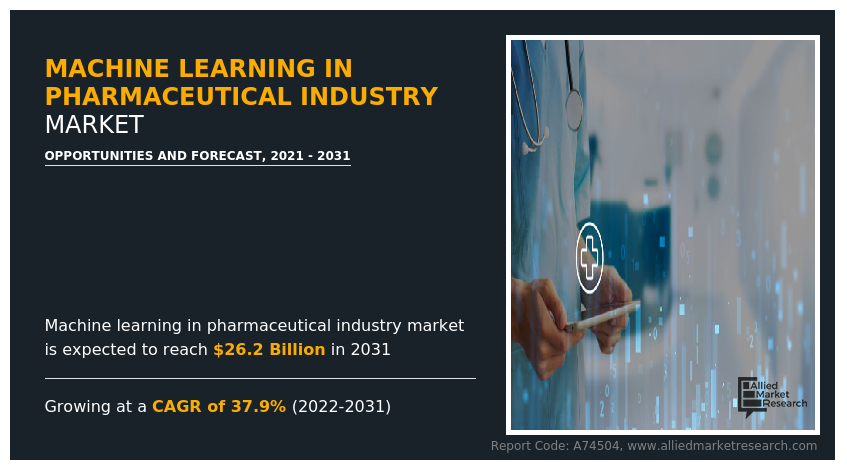
Machine learning (ML) is increasingly being used in the pharmaceutical industry to aid in drug discovery and development. ML techniques can be used to analyze large amounts of data, including genomics, proteomics, and metabolomics data, to identify new drug targets and potential drug candidates. ML algorithms can also be used to predict the effectiveness of potential drug candidates, which can help researchers prioritize which drug candidates to pursue further in the drug development process. This can save time and resources by reducing the number of drug candidates that need to be tested in clinical trials. The use of ML in drug discovery and development has the potential to revolutionize the pharmaceutical industry by making the drug development process faster, more efficient, and more effective in delivering new treatments to patients.
The limited data availability is a significant challenge for machine learning applications in the pharmaceutical industry. There are strict regulations around patient privacy and confidentiality, which can make it challenging to access large amounts of data needed to train machine learning algorithms effectively. In addition, some pharmaceutical companies may be hesitant to share their data with others due to concerns about intellectual property and competition. Therefore, data sets may be smaller and less diverse, making it more difficult to train accurate machine learning models.
Machine learning has tremendous potential in the field of personalized medicine within the pharmaceutical industry. By leveraging large amounts of patient data and applying advanced analytical techniques, machine learning algorithms can help identify the most effective treatment options for individual patients based on their unique characteristics. The machine learning in personalized medicine involves analysis of large and complex data sets, including genomic data, electronic health records, and patient-reported outcomes. This can help identify patterns and correlations that may not be immediately apparent to human analysts, enabling more precise and personalized treatment recommendations. Machine learning can also help improve clinical trial design by identifying patient populations that are most likely to benefit from a particular treatment.
Segment Overview
The machine learning in pharmaceutical industry is segmented on the basis of component, enterprise size, deployment. and region. By component, the market is divided into solution and services. By enterprise size, the market is classified into SMEs and large enterprises. By deployment, the market is classified into cloud and on-premise. By region, the market is analyzed across North America, Europe, Asia-Pacific, and LAMEA. The market is segmented into Component, Enterprise Size and Deployment.
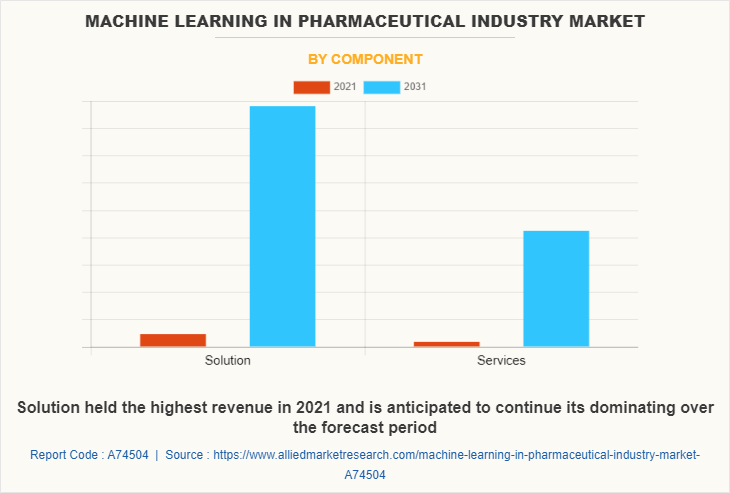
By component, the solution sub-segment dominated the market in 2021. The pharmaceutical industry generates vast amount of data while developing and discovering the drugs. ML algorithms can process and analyze this data to identify patterns, relationships, and insights that can inform drug development decisions. The need for faster and more cost-effective drug discovery and development processes further augments the demand of machine learning solutions in the pharmaceutical sector. By using ML to streamline various stages of the drug development pipeline, pharmaceutical companies can reduce the time and resources required to bring new drugs to market. These are predicted to be the major factors driving the market forecast period.
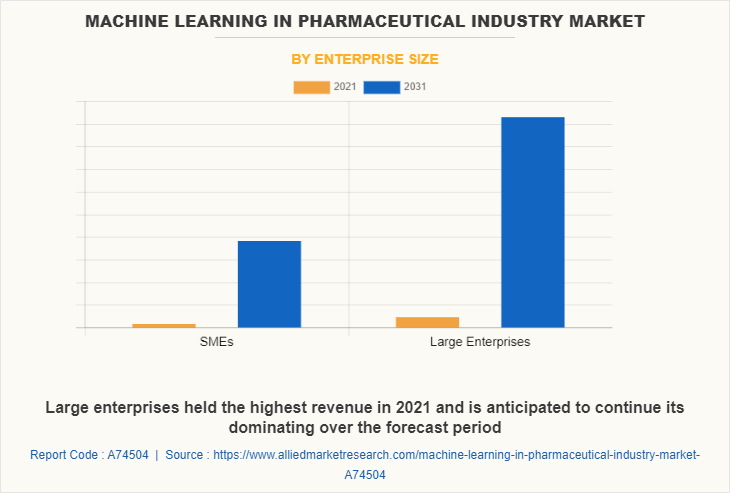
By enterprise size, the large enterprises sub-segment dominated the global machine learning in pharmaceutical industry market share in 2021. Machine learning technology can help large pharmaceutical companies analyze huge volumes of data from various sources, including clinical trials, electronic health records, and genetic information, to identify potential drug targets, predict patient outcomes, and optimize clinical trial design. Large pharmaceutical companies have the resources and expertise to invest in developing and implementing machine learning technologies in-house, as well as to acquire smaller companies that specialize in this area.
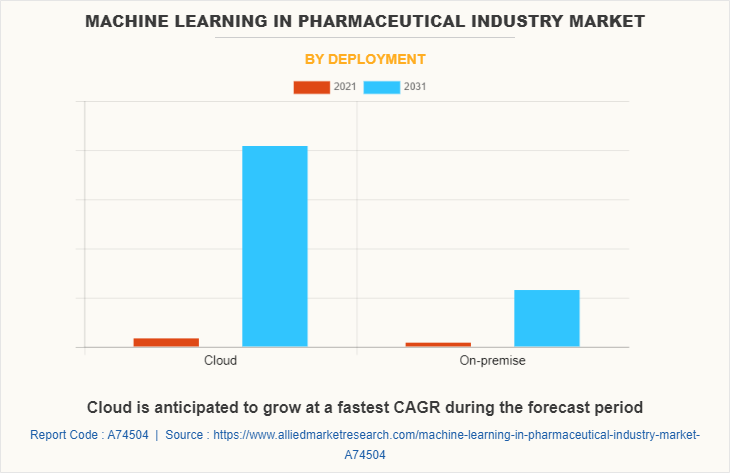
By deployment, the cloud sub-segment dominated the market in 2021. Cloud computing provides a scalable and cost-effective platform for storing and analyzing large datasets, which is crucial for machine learning applications in drug discovery and development. The cloud allows pharmaceutical companies to access powerful computational resources and sophisticated algorithms without the need to invest in expensive hardware or software infrastructure. In addition, the cloud enables collaboration and data sharing across teams and organizations, which is essential for accelerating drug discovery and development. These are predicted to be the major factors boosting the market size during the forecast period.
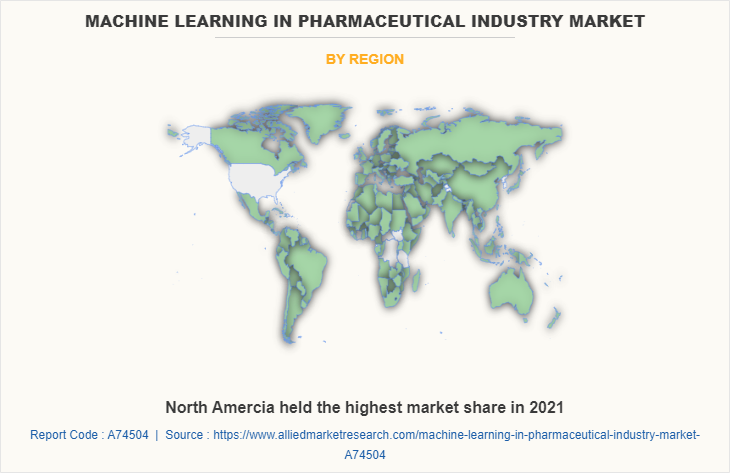
By region, North America accounted for a dominant market share in 2021. The pharmaceutical industry in North America is a significant contributor to the global healthcare market, with a strong focus on R&D. In recent years, the industry has increasingly adapted machine learning to drive innovation, improve efficiency, and accelerate drug discovery and development. The region is home to many of the world's leading pharmaceutical companies, research institutions, and healthcare providers, generating massive amounts of data from clinical trials, electronic health records, and other sources.
Key Market Players
The key players profiled in this report include Cyclica Inc., BioSymetrics Inc., Cloud Pharmaceuticals, Inc., Deep Genomics, Atomwise Inc., Alphabet Inc., NVIDIA Corporation, International Business Machines Corporation, Microsoft Corporation, and IBM.
Impact of COVID-19
The COVID-19 pandemic had a significant impact on the pharmaceutical industry. Machine learning algorithms were used to analyze large databases of molecular structures and predict which compounds are most likely to be effective against the virus.
Machine learning has been used to analyze massive amounts of data, including genetic and clinical data, to identify potential drug candidates for COVID-19. This accelerated the drug discovery process, allowing researchers to identify promising candidates much faster than traditional methods.
Machine learning models can predict the spread of COVID-19 and identify high-risk populations. These predictions can help public health officials allocate resources and prioritize vaccination efforts.
Machine learning can be used to optimize manufacturing processes and ensure the efficient supply of drugs and medical equipment. This was especially important during the COVID-19 pandemic, when there was an increase in demand for drugs.
Key Benefits for Stakeholders
This report provides a quantitative analysis of the market segments, current trends, estimations, and dynamics of the machine learning in pharmaceutical industry market analysis from 2021 to 2031 to identify the prevailing ML in pharmaceutical industry market opportunities.
The market research is offered along with information related to key drivers, restraints, and opportunities.
Porter's five forces analysis highlights the potency of buyers and suppliers to enable stakeholders make profit-oriented business decisions and strengthen their supplier-buyer network.
In-depth analysis of the ML in pharmaceutical industry market segmentation assists to determine the prevailing market opportunities.
Major countries in each region are mapped according to their revenue contribution to the global market.
Market player positioning facilitates benchmarking and provides a clear understanding of the present position of the market players.
The report includes the analysis of the regional as well as global market trends, key players, market segments, application areas, and machine learning in pharmaceutical industry market growth strategies.
Machine Learning in Pharmaceutical Industry Market Report Highlights
| Aspects | Details |
| Market Size By 2031 | USD 26.2 billion |
| Growth Rate | CAGR of 37.9% |
| Forecast period | 2021 - 2031 |
| Report Pages | 280 |
| By Component |
|
| By Enterprise Size |
|
| By Deployment |
|
| By Region |
|
| Key Market Players | Alphabet Inc., cyclica inc., Deep Genomics, BioSymetrics Inc., Atomwise Inc., IBM, Cloud Pharmaceuticals, Inc., NVIDIA Corporation, Microsoft Corporation, International Business Machines Corporation |
Analyst Review
The pharmaceutical industry is increasingly using machine learning to analyze healthcare data for a variety of applications, including drug discovery, clinical trials, and personalized medicine. The pharmaceutical industry generates a vast amount of data from various sources, including clinical trials, electronic health records, and medical claims. Machine learning algorithms can help process and analyze this data to identify patterns and trends that might be missed using traditional statistical method. Machine learning can be used to develop personalized treatment plans for patients based on their individual characteristics, such as genetic makeup, medical history, and lifestyle factors. This factor is expected to drive the growth of the market during the forecast period. However, pharmaceutical companies often have multiple data systems that do not communicate with each other. This lack of interoperability can make it difficult to aggregate and analyze data across different departments and business units, which is a key factor expected to hamper the market growth in the upcoming years. Machine learning can be used to detect adverse drug reactions and predict potential safety issues before they occur. By analyzing large amounts of data from electronic health records, social media, and other sources, machine learning algorithms can identify patterns that might not be apparent to human analysts.
Among the analyzed regions, North America is expected to account for the highest revenue in the market by the end of 2031, followed by Europe, Asia-Pacific, and LAMEA. Rising clinical trials, an increasing number of drug discoveries and development, along with a rising prevalence of chronic diseases, and technological advancements in the region's pharmaceutical industry are the major factors driving the growth of the market in North America.
The major growth strategies adopted by machine learning in pharmaceutical industry market players are investment and agreement.
The diverse applications of machine learning to predict the efficacy and safety of potential new drugs, reducing the time and cost involved in the drug discovery and development process is expected to drive the market growth. ML is particularly useful for identifying drug candidates that have a high likelihood of success, potentially reducing the risk of failure during clinical trials which is estimated to generate excellent opportunities in the machine learning in pharmaceutical industry market.
Asia-Pacific will provide more business opportunities for the global machine learning in pharmaceutical industry market in the future.
Cyclica Inc., BioSymetrics Inc., Cloud Pharmaceuticals, Inc., Deep Genomics, Atomwise Inc., Alphabet Inc., NVIDIA Corporation, International Business Machines Corporation, Microsoft Corporation, and IBM are the major players in the machine learning in pharmaceutical industry market.
The large enterprises sub-segment of the enterprise size acquired the maximum share of the global machine learning in pharmaceutical industry market in 2021.
Pharmaceutical companies are the major customers in the global machine learning in pharmaceutical industry market.
The report provides an extensive qualitative and quantitative analysis of the current trends and future estimations of the global machine learning in pharmaceutical industry market from 2021 to 2031 to determine the prevailing opportunities.
Growing application of machine learning in pharmaceutical industry in the increased efficiency in clinical trials and improved supply chain management is anticipated to boost the machine learning in pharmaceutical industry market in the upcoming years.
Loading Table Of Content...
Loading Research Methodology...



